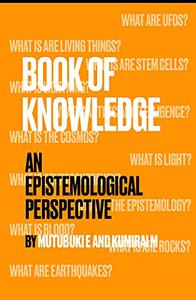
Book Of Knowledge: An Epistemological Perspective by E H Mutubuki, M P Kumirai
English | June 30, 2021 | ISBN: N/A | ASIN: B098CZ7RH4 | 155 pages | MOBI | 0.43 Mb
The rationale for having a 'book of knowledge' in schools and homes covers a wide area of discussion. Encyclopedias and other scientific reference books are either unobtainable, too costly, too brief in explanation, full of jargon or voluminous and cumbersome. So for teachers, students and laypersons these sources are of little use.
A book that attempts to explain scientific concepts and ideas in a simple, mundane and comprehensive manner should have greater appeal to those who wish to know more about their environment and themselves. My years of experience as a student, teacher, lecturer, administrator, parent and husband have left me convinced that there is a vast gap between bookish and school learning and knowledge of real important issues. Time and again one comes across school, college and University educated people who cannot understand ordinary phenomena.
They lack elementary knowledge of common issues of a general but important nature. This book attempts to meet the dearth of reading and learning materials exacerbated by the rapid expansion in education since independence. Schools have mushroomed with school populations rising on a geometric progression.
To meet all this, personnel of different backgrounds, training and abilities have been recruited into our schools. These people, with limited learning/teaching resources, need back up in form of sources of knowledge like this book. The rapid explosion of knowledge and data means that learners need to be equipped with the skills and appetite to find more and learn on their own.
More importantly a book that attempts to explain phenomena helps a lot in eradicating superstition and ignorance. I have often talked to very learned people with studies in the cultural and social sciences who, for instance believe that an ordinary peasant can cause lighting or use charms in running a modern business enterprise. Many of us have met 'educated' people who insist hyenas and snakes are familiars of witches and sorcerers. For a nation to progress it needs people who are free from the shackles of ignorance and superstition. A book of this nature and size cannot answer all the questions but can clarify certain things.
This is the beginning of set people thinking and questioning their wisdom. This book is a result of years of experience with children, pupils, students and adults. I used to run lectures and courses for interested persons like students and pupils on topics covered in this book. A number of topics included were originally written for my children ranging in age from ten to fourteen. Many former students and colleagues have asked me to send them notes on topics of interest for their pupils and children. So in response to this need I have decided to compile the topics of interest into a book. As Duncan Weston in the, Encyclopedia of Ignorance, aptly said, "What we think we know as knowledge is but a drop in an ocean of ignorance." So we have to learn.
Links are Interchangeable - No Password - Single Extraction



